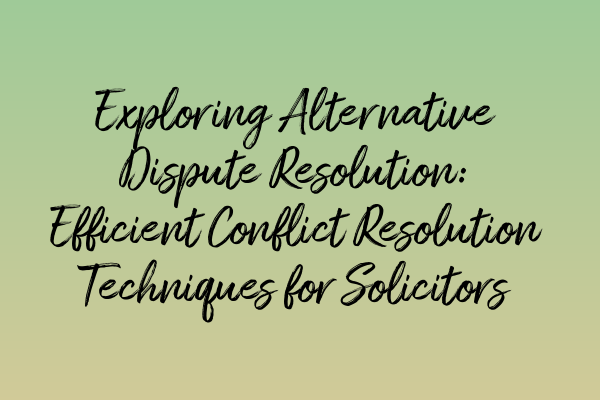Exploring Alternative Dispute Resolution: Efficient Conflict Resolution Techniques for Solicitors
Conflict is an inherent part of our society, and as solicitors, it is our duty to assist clients in resolving disputes efficiently and effectively. Traditional litigation can be time-consuming, costly, and emotionally draining for all parties involved. However, there are alternative dispute resolution (ADR) techniques available that can provide a quicker and more amicable resolution. In this blog post, we will delve into some of the most prominent ADR methods and how they can benefit both solicitors and their clients.
What is Alternative Dispute Resolution?
Alternative Dispute Resolution (ADR) refers to a range of techniques used to resolve disputes outside of the courtroom. These methods provide a less adversarial approach and focus on finding mutually acceptable solutions through negotiation, mediation, or arbitration.
The Benefits of Alternative Dispute Resolution
1. Time and Cost Efficiency: ADR processes are generally quicker and more cost-effective compared to traditional litigation. This is especially important for solicitors and their clients who want to resolve their disputes promptly and without draining their resources.
2. Confidentiality: ADR methods, such as mediation and arbitration, offer a level of confidentiality that can be beneficial for parties who wish to keep their disputes out of the public eye. In some cases, this can help preserve reputations and maintain relationships.
3. Control: ADR gives parties more control over the outcome of their dispute. Unlike litigation, where a judge or jury makes the final decision, ADR allows parties to actively participate in finding a solution that meets their interests and needs.
4. Maintaining Relationships: ADR methods are known for their collaborative nature, which can help preserve relationships, especially when the dispute involves ongoing personal or business connections.
Types of Alternative Dispute Resolution
1. Mediation: Mediation is a voluntary and flexible process where a neutral third party, known as a mediator, helps the parties involved in the dispute reach a mutually agreeable resolution. The mediator facilitates communication and assists in identifying common ground while allowing each party to express their concerns and interests. Mediation can be particularly effective in resolving family law, employment, and contractual disputes.
2. Arbitration: Arbitration is a more formal alternative to litigation where a neutral third party, called an arbitrator, listens to both sides of the dispute and makes a legally binding decision. The process is less formal than going to court, but the decision reached by the arbitrator is enforceable. Many commercial and international disputes are resolved through arbitration due to its flexibility and efficiency.
3. Negotiation: Negotiation is a process in which parties discuss their differences and attempt to reach a mutually beneficial solution without the need for a third-party mediator or arbitrator. Negotiation can take place informally or as part of a structured process, such as collaborative law, where each party is represented by their solicitor. Negotiation allows parties to have direct control over the resolution process and can be used in a wide range of disputes.
When to Consider Alternative Dispute Resolution
Alternative Dispute Resolution should be considered in various situations: Early Intervention: ADR techniques are most effective when employed early in the dispute resolution process. By engaging in ADR at the onset of a dispute, solicitors can help their clients avoid protracted litigation and reach a resolution more quickly.
2. Complex or Multi-Party Disputes: ADR can be particularly useful in complex cases where numerous parties are involved. It allows for a more tailored and creative approach to dispute resolution, addressing the specific needs and interests of all parties involved.
3. Preserving Relationships: When a dispute involves ongoing relationships, such as business partnerships or familial connections, ADR methods like mediation can help parties find common ground and maintain their connections moving forward.
Conclusion
As solicitors, it is crucial to explore all avenues of conflict resolution for the benefit of our clients. Alternative Dispute Resolution offers an efficient and amicable way to resolve disputes, saving time, money, and emotional energy. By considering mediation, arbitration, or negotiation early in the process, solicitors can help their clients achieve a satisfactory resolution and preserve important relationships.
For more resources on legal practice, check out these related articles:
- SQE Prep Made Easy: Strategies and Resources
- SQE Prep: Tips and Tricks to Excel in Criminal Law
- Terrorism and Criminal Law: Balancing National Security with Justice
- Cross-Examination Techniques: Mastering the Art of Questioning
- Private Prosecutions: Exploring Non-Governmental Prosecutions in Criminal Cases


Leave a Reply